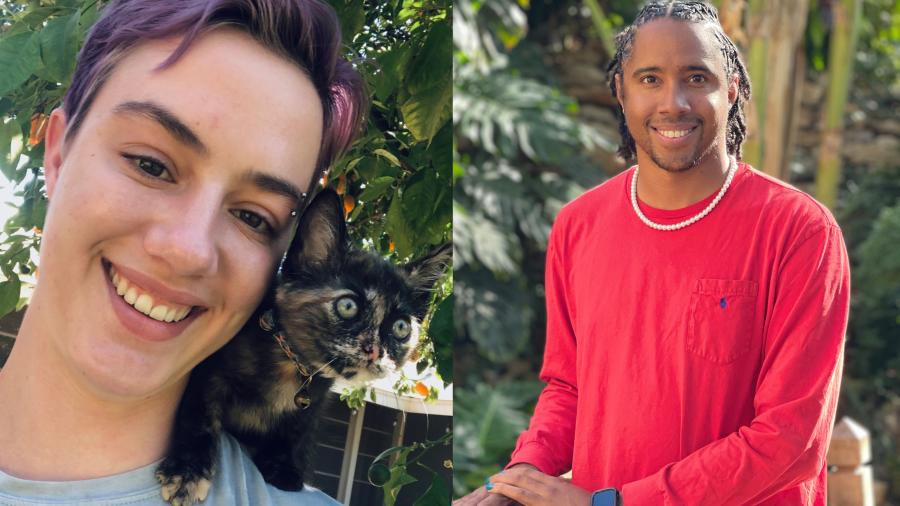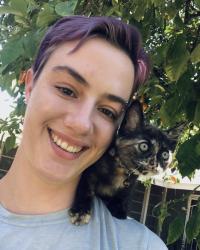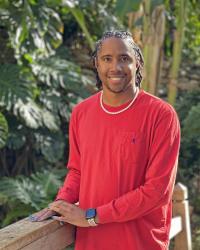Souls of SOLS, January 2025
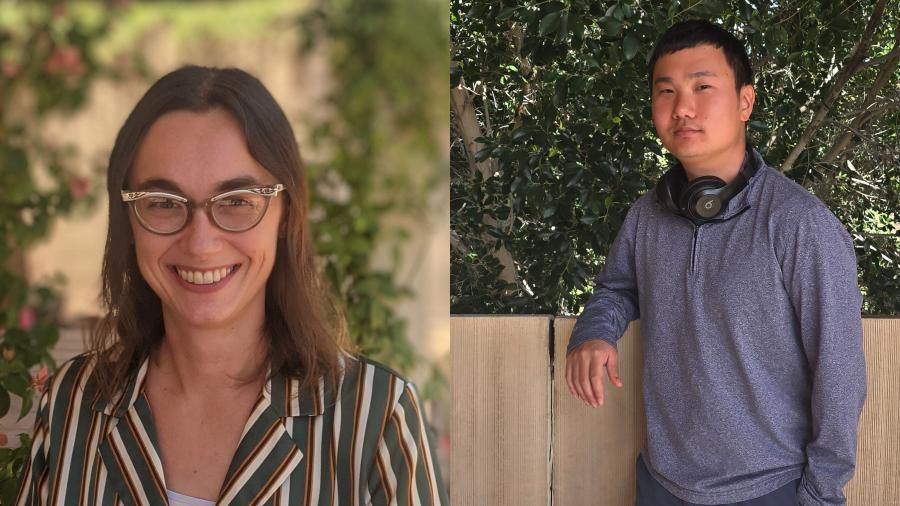
Nolina Doud, left, is a PhD candidate in the History and Philosophy of Science program. Jonathan Kim, right, is a PhD candidate in the Biology and Society program.
Note: This story is part of an ongoing series profiling graduate students in the School of Life Sciences. See November's featured students here.
Nolina Doud –– History and Philosophy of Science PhD
When Nolina Doud worked at a rustic California vineyard, she new that one of the vineyard’s main attractions was its nature. But guests weren’t equally enthused about all the vineyard’s ecological residents; while they’d gasp at the picturesque landscape or fawn over endless rows of grape vines, they’d recoil when encountering a snake or a wasp, creatures that are important to the vineyard’s ecosystem.
“There were all of these funny interactions where essentially I was wondering, what did you think nature was?” Doud recounts with a laugh, “And what were you pursuing in coming here if not the reality of being outdoors?”
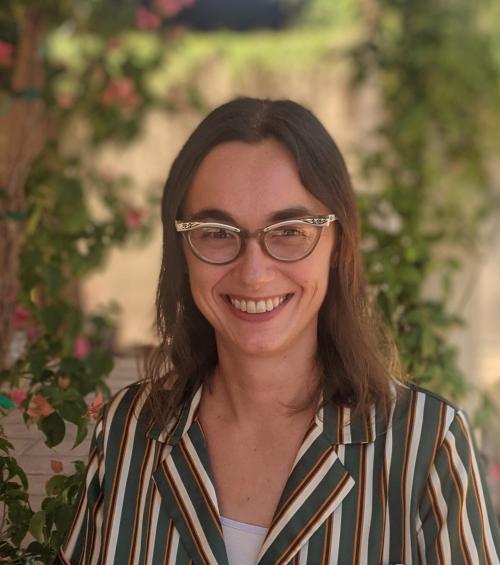
Doud started working at the vineyard shortly after finishing her master’s degree in philosophy of science and technology, which she earned at University of Twente in Enschede, the Netherlands. Watching guests interact with the vineyard’s ecosystem pushed her to question where their perceptions of nature came from. After some years, she decided to go back to school to study it.
“That experience, on the broadest conceptual level, is what brought me to ASU. I wanted to ask: How are people thinking about nature? And how are those attitudes being informed by their experiences in person, in school, in media, and so on.”
For her PhD, Doud is investigating a smaller piece of that broader interest by studying how conservation and sustainability students are impacted by their coursework experiences. Rather than focusing on what information they learn in their courses, Doud is looking at how field courses affect how students feel about nature, like whether students think nature is worthy of protection or feel like they are the type of person who belongs in nature. She’s particularly interested in whether online students in those majors are having different experiences than those who are learning in person.
“To some people it seems almost paradoxical to teach a traditionally field-based discipline like conservation biology in a distanced online format,” Doud explains.
“The fact that it intuitively feels wrong is an interesting thread to pull, because it then raises the question of what’s different between these conditions, and what we are trying to accomplish with each... That thread gets us to think about why we teach with the techniques that we do in different contexts.”
Ultimately, Doud articulates that the goal of her work is to inform how teachers in those fields approach teaching and assessing their students.
“As a philosophy background, it was really important for me to do something that was useful to someone, and that felt meaningful and tangible, because there is a perception that philosophy is so theoretical... that it’s not doing things in the world. So, it was always important for me to have use-inspiration throughout the whole thing.”
Jonathan Kim – Biology and Society PhD
Eagle Butte, South Dakota, is not where Jonathan Kim expected to end up. An unassuming spot in the middle of the Cheyenne River Indian Reservation, just over 1000 people called the town home.
Kim, who had just graduated with a master’s in public health from the University of Michigan, was there working for the newly-created Native Biodata Consortium, a nonprofit genetic research institute and biorepository. Unlike other genetic research institutes, though, the Consortium was run for and by Native people, promising to protect their genetic data and share research profits with the communities the data came from.
“Getting to see [the Consortium] go from being just a few people to growing into what it is now is the best privilege I ever got.”
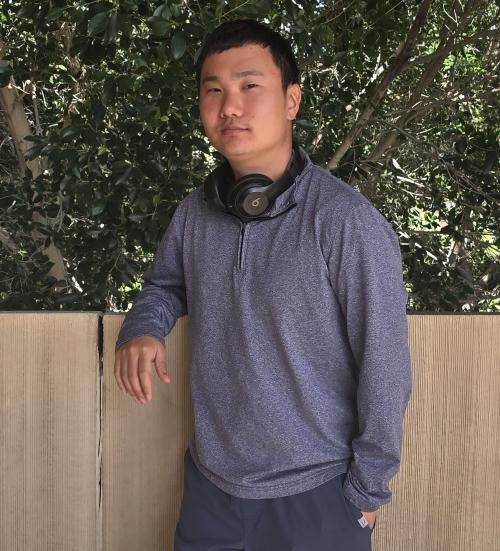
Kim, who grew up in a largely Korean community in southern Ohio, ended up at the Consortium through luck. After attending a lecture series by Krystal Tsosie, an Indigenous geneticist and activist who now teaches at ASU, he reached out to Tsosie, and she offered him a job.
“This was not like other jobs. The work [the Native Biodata Consortium] was doing meant a lot to the people out there,” Kim reflects. “I felt guilty because I felt like I was lacking in skills to really help them with what they needed... That’s why I joined Krystal’s lab [at ASU], to try and be the kind of researcher that can help with those causes.”
Now, as part of the Tsosie Lab for Indigenous Genomic Equity and Justice, Kim hopes to build on the laboratory skills he developed working with the Consortium. But his dissertation research will largely take more of a social science bend: he wants to study the perceptions that Indigenous communities have of neurodevelopmental conditions like autism, a condition he is diagnosed with himself.
“[Many Indigenous people] don’t abide by the very pathological model that we view these neurological conditions as. That’s seen throughout a lot of different cultures – it isn’t considered a disease in the way that we see it. That can perhaps give us insight into how we treat individuals who seem different to us.”
Kim has always been interested in neurodevelopmental conditions, having spent much of his life questioning whether his own personality has been more influenced by genetics or the culture he was raised in. When he was diagnosed with autism as an adult, his questions about how the influence of nature versus nurture only intensified. That’s led him to wonder about the experiences of other underrepresented people with autism.
“Despite being aware that autism is a spectrum, we’re not very good at diversifying when it comes to [studying it]. We don’t even know a lot about autism in females, for example, and so I can’t imagine what that’s going to be like for whole other racial or ancestral identities that are equally undiagnosed or getting later diagnoses than general European or Caucasian populations.”
Kim will also be investigating the ethics of recent innovations aiming to study autism through imbuing stem cells with genes associated with the condition. In studying both the genetics of autism and the social dimensions of the condition, Kim aims to build on skills he can use to serve the populations he has spent years working with. He might even start to uncover answers to his own life-long questions in the process.
